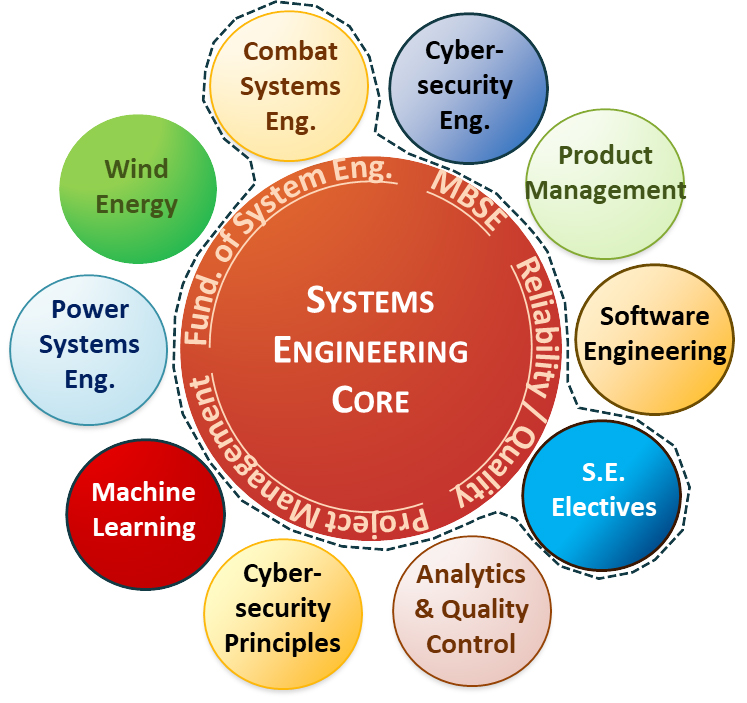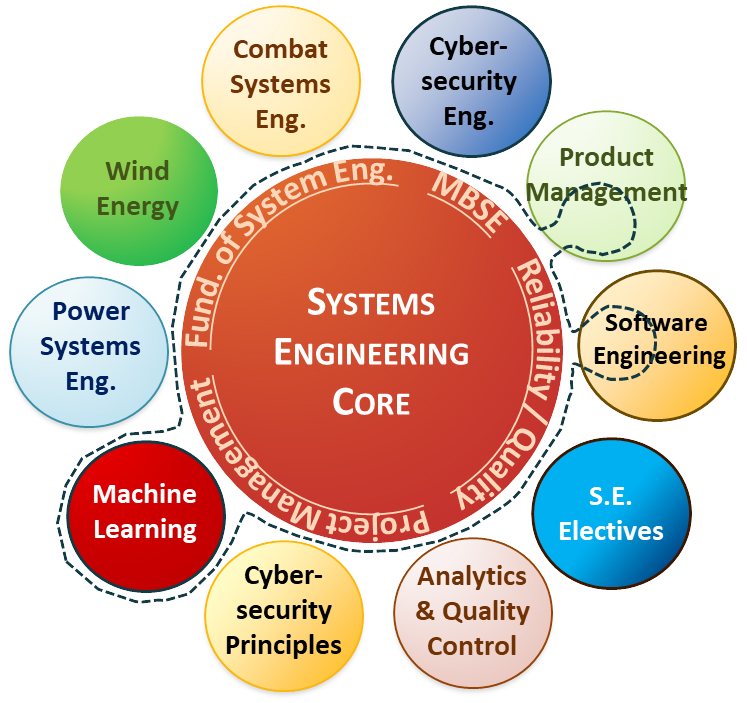MS in Systems Engineering
MS in Systems Engineering
Master of Science in Systems Engineering at Rowan
Systems Engineering involves the design, integration, and management of complex and large-scale systems over their life cycles. As such, Systems Engineering bridges many of the existing engineering disciplines, as design, integration, and management of complex, large-scale systems are common to all engineering disciplines. Systems engineers are employed in a wide spectrum of industries, including defense, communications, power and energy systems, computing systems, AI systems, as well as many cyberphysical systems. While the nation’s institutions of higher education graduate a sufficient number of professionals in core traditional engineering disciplines, there is an unmet need for qualified professionals who have the necessary knowledge and skills to integrate such complex and large-scale systems across different disciplines. In fact, many graduates of traditional engineering programs ultimately work as systems engineers.
The ECE department at Rowan University now offers a brand new and innovative Master of Science in Systems Engineering (M.S. in S.E.) program.
Because systems engineers come from – and work in – a diverse array of engineering fields, Rowan’s M.S. in S.E. program is designed to be highly flexible, accommodating a wide range of backgrounds and career opportunities. The unique structure of this program will allow you to select and complete a certificate of graduate study (COGS) as an additional credential and sample and select from a variety of COGS as well as a wide spectrum of courses as additional systems engineering electives. The M.S. in S.E. program currently features nine focus areas, each represented with a COGS, and additional ones will be added as they become available.
This unique program will not only equip you with fundamental knowledge, skills, and abilities specific to systems engineering but will also allow them to develop additional critical essential skills, such as communications, management, leadership, problem-solving, planning, innovation, writing, and research. The combination of engineering courses offers an ideal balance of systems engineering and design, providing students with a broad knowledge of science and business to draw from as they solve problems in engineering environments.
Admission Requirements
- Completion of a bachelor’s degree in engineering or a related area of science or mathematics from an accredited institution of higher education. Official transcripts will be required.
- Minimum cumulative GPA of 2.7 (on a 4.0 scale) or better
- Two letters of recommendation describing the applicant’s ability to undertake rigorous graduate-level work.
- Typewritten statement of professional objectives.
- Current curriculum vitae or resume
- For international students, evidence of English proficiency is required through one of the university-recognized mechanisms.
- Submission of standardized tests, such as the GRE, is not required, but can be submitted if already available.
- For nontraditional applicants, including those transitioning from non-engineering disciplines or from military backgrounds to systems engineering, the admission committee will provide a case-by-case review, evaluation, and program planning as needed. If the applicant has already been in the workforce for a significant amount of time, their experience, along with a letter from their direct supervisor, may be used to make accommodations to the GPA or field of bachelor’s degree requirement.
For the latest information, admission requirements, and to apply online, please visit the MS in Systems Engineering Program Application Portal.
The application deadlines are as follows:
To start your program in the Summer, apply by April 1 of that year.
To start your program in the Fall, apply by July 1 of that year.
To start your program in Spring, apply by November 1 of the previous calendar year.
Graduation Requirements
The ECE department at Rowan University offers two options (tracks) for this program: thesis and non-thesis. Both tracks consist of 30 credits and lead to the M.S. in Systems Engineering degree. To maintain minimum satisfactory academic progress in – and to successfully graduate from – M.S. in Systems Engineering program, students must:
- Complete 30 graduate credits from approved courses with a GPA of 2.7 or higher.
- Grades in the required courses must be B- or better.
- No more than two elective courses with a C or C+ may be counted towards graduation requirements.
- Grades of C- or lower may not be used towards graduation requirements.
- Students must maintain a GPA of 2.7 or higher. A minimum cumulative GPA of 3.0 is also required to graduate.
- Thesis track students must successfully complete 6 credits of thesis work, and pass the thesis defense.
Curricular Structure of the M.S. in Systems Engineering Program
The M.S. in Systems Engineering program consists of 30 credits. For non-thesis track, all 30 credits come from 10 courses (3 credits each), including
- four required courses that constitute the Systems Engineering core (12 credits),
- four restricted electives constituting a focus area (obtained by selecting and completing any of the approved Certificate of Graduate Study – COGS, 12 credits), and
- two additional Systems Engineering (S.E.) electives (6 credits).
For thesis students, the two last electives are replaced with 6 credits of ENGR 01.599 Master’s Thesis Research through which they complete a thesis.
The structure of the program allows the students to complete any of the approved certificates of graduate studies (COGS) while sampling additional electives from other COGS and/or approved courses that are outside of the COGS based on their interest. The figure below conceptually illustrates two of the many options within the overall structure of the program, consisting of the Systems Engineering core, a COGS, and additional electives to best meet the needs of your specific career goals. The complete list of currently approved COGS is also listed below.
 Figure 1(a). Conceptual illustration of the M.S. in Systems Engineering program with Combat Systems Engineering COGS as the focus area, and electives chosen from a wide array of additional S.E. electives bank outside of the other COGS.
Figure 1(a). Conceptual illustration of the M.S. in Systems Engineering program with Combat Systems Engineering COGS as the focus area, and electives chosen from a wide array of additional S.E. electives bank outside of the other COGS.
 Figure 1(b). Conceptual illustration of the M.S. in Systems Engineering program with Machine Learning COGS as the focus area, and electives selected from the course offerings of the Product Management and Software Engineering COGS
Figure 1(b). Conceptual illustration of the M.S. in Systems Engineering program with Machine Learning COGS as the focus area, and electives selected from the course offerings of the Product Management and Software Engineering COGS
Detailed Curriculum with Course Listings
Systems Engineering Core (4 courses / 12 credits)
Complete the two required courses, then choose one from each of the following banks
| Course # | Course Name | Grade | Credits |
| ECE 09.521 | Fundamentals of Systems Engineering | B- or better | 3 |
| ECE 09.527 | Model-Based Systems Engineering -Prerequisite: ECE 09.521 |
B- or better | 3 |
| CHOOSE ONE OF THE FOLLOWING RELIABILITY / QUALITY CONTROL /STATISTICS COURSES | |||
| ECE 09.528 ECE 09.568 ME 10.530 ME 10.561 ChE 06.585 MATH 03.511 MATH 03.512 STAT 02.510 |
Reliability in Systems Engineering (recommended choice) Discrete Event Systems Reliability Engineering Engineering Optimization Engineering Quality Control Operations Research I Operations Research II Introduction to Statistical Analysis |
B- or better | 3 |
| …And THEN CHOOSE ONE OF THE FOLLOWING ENGINEERING / PROJECT MANAGEMENT COURSES | |||
| ECE 09.529 EM 01.543 MGT 06.677 MIS 02522 MIS 02525 MIS 02526 |
Project Management in Systems Engineering (recommended choice) Systems for Engineering Management Management Skills for Engineers Systems Analysis and Design* Project Management* Project Management for Engineers |
B- or better | 3 |
* Seat availability in MIS courses may be limited with priority given to College of Business majors
Subtotal: 12 S.H.
Certificates of Graduate Studies (4 courses, 12 credits)
Choose any of the approved COGS listed below and complete its four-course sequence.
| Course # | Course Name | Grade | Credits |
| COGS in Combat Systems Engineering (CSE) | |||
| ECE 09.523 ECE 09.524 ECE 09.525 ECE 09.526 |
Advanced Radar Systems Advanced War Gaming and C4ISR Advanced Command and Control Advanced Weapon Systems |
B- or better | 3 |
| COGS in Cybersecurity Engineering (CyberEng) | |||
| ECE 09.580 ECE 09.585 ECE 09.587 ECE 09.588 |
Internet of Things Engineering Cybersecurity IoT Hardware Engineering and Security Cloud Hardware Architecture and Security |
B- or better | 3 |
| COGS in Machine Learning (ML) | |||
| ECE 09.555 ECE 09.558 ECE 09.560 ECE 09.595 ECE 09.566 |
Machine Learning Reinforcement Learning Modern Neural Networks Adv. Emerging Topics in Machine Learning Systems, Devices and Algorithms in Bioinformatics Notes: Take ECE 09.555, ECE 09.558 and then any two of ECE 09.560, ECE 09.566, ECE 09.595. |
B- or better | 3 |
| COGS in Power Systems Engineering (PSE) | |||
| ECE 09.508 ECE 09.510 ECE 09.515 ECE 09.516 ECE 09.572 |
Advanced Power Systems Engineering Advanced Alternate Energy Systems Emerging Electricity Market Advanced Power Electronics Advanced Smart Grid Notes: Take ECE 09.508 and ECE 09.510, then choose and two of the remaining three (ECE09.515, ECE 09.516, and ECE 09.572). |
B- or better | 3 |
| COGS in Wind Energy Systems (WES) | |||
| ECE 09.517 ECE 09.518 ME 10. 535 ECE 09.572 |
Technologies Towards Green Energy Future Wind Energy System Planning and Operation Wind Energy Advanced Smart Grid Notes: Take ECE 09.517, EC E09.518 and ME 10.535. Then take either ECE 09.572 (recommended) or any of the courses in COGS in PSE. |
B- or better | 3 |
| COGS in Project Management (PM) | |||
| EM 01.513 EM 01.542 MGT 06.666 MGT 06.677 |
Engineering Decision Making Facilities Management Managing Engineering Teams Management Skills for Engineers Notes: If choosing this course, pick a different class than MGT 06.677 under the above-listed required courses. |
B- or better | 3 |
| COGS in Engineering Analytics and Quality Control (EAQC) | |||
| ChE 06.577 ChE 06.640 ChE 06.641 ChE 06.642 |
Advanced Engineering Processes Engineering Process Analysis Engineering State Process Control Quality Control Methods and Metrics |
B- or better | 3 |
| COGS in Software Engineering (SoE) | |||
| CS 04.524 CS 02.530 CS 04.515 CS 04.580 CS 04.623 CS 04.670 |
Agile Software Engineering Advanced Database Systems: Theory & Prog. Embedded Systems Programming Human Centered Computing Advanced Software Engineering Advanced Object-Oriented Design Notes: To complete this COGS, take CS 04.524 and then three of the remaining courses for a total of 12 credits. Only the courses listed here apply towards MS in S.E. |
B- or better | 3 |
| COGS in Cybersecurity Principles (CP) | |||
| CS 03.500 CS 03.506 CS 03.551 CS 03.570 CS 03.580 |
Foundations of Cybersecurity Cybersecurity Management, Policy, and Risk Advanced Cybersecurity Principles and Applications Cyber Defense of Operating Systems and Networks Cloud Computing and the Internet of Things – Arch. & Sec. Notes: Take any four of these five courses. |
B- or better | 3 |
Subtotal: 12 S.H.
Systems Engineering Electives
Choose any of the two courses from the following list. You may also choose any of the courses from any of the COGS listed above (other than those you have already taken to complete your main COGS).
| Course # | Course Name | Grade | Credits |
| ECE 09.536 | Systems on Chips: Design and Analysis | C+ or better | 3 |
| ECE 09.537 | Microsystems and Microfabrication | C+ or better | 3 |
| ECE 09.538 | Nanoelectronics, Nanophotonics and Nanotech. | C+ or better | 3 |
| ECE 09.551 | Digital Signal Processing | C+ or better | 3 |
| ECE 09.552 | Digital Image Processing | C+ or better | 3 |
| ECE 09.556 | Advanced Embedded Software Design | C+ or better | 3 |
| ECE 09.568 | Discrete Event Systems | C+ or better | 3 |
| ECE 09.573 | Advanced Smart Sensors | C+ or better | 3 |
| ECE 09.586 | Advanced Portable Platform Development | C+ or better | 3 |
| ENGR 01.510 | Finite Element Analysis | C+ or better | 3 |
| ENGR 01.512 | Principles of Nanotechnology | C+ or better | 3 |
| ENGR 01.569 | Connected Vehicle Technology | C+ or better | 3 |
| ME 10.533 | Renewable Energy: PVs and Energy Harvesting | C+ or better | 3 |
| ME 10.540 | Advanced Manufacturing | C+ or better | 3 |
| ME 10.542 | Advanced Mechatronics | C+ or better | 3 |
| ME 10.543 | Design for X | C+ or better | 3 |
| ME 10.561 | Engineering Optimization (if not already chosen above) | C+ or better | 3 |
| ME 10.566 | Soft Robotics | C+ or better | 3 |
| ME 10.582 | Flight Dynamics | C+ or better | 3 |
| ENT 06.505 | Entrepreneurship and Innovation | C+ or better | 3 |
| MGT 06.531 | Sustainability Assessment | C+ or better | 3 |
| MGT 06.532 | Top. Sustainability, Innovation, and Problem Solv. | C+ or better | 3 |
| MGT 06.666 | Managing Engineering Teams | C+ or better | 3 |
| MGT 07.510 | Quality Analytics | C+ or better | 3 |
| MKT 09.605 | Supply Chain Strategy | C+ or better | 3 |
| SCL 01620 | Analytics for Supply Chain Management | C+ or better | 3 |
Subtotal: 6 S.H.
Not all courses are offered every semester. Please check with the respective department offering the course, and/or Section Tally for course schedules.






